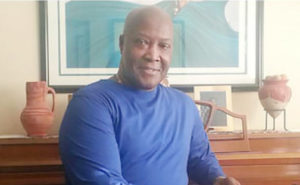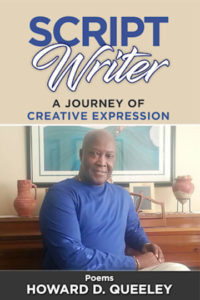by G.Anthony Abraham

Most of us approach poems as one is supposed to approach a captured animal. From the side, not head first. Cautiously, we move through a world of angles and obliques, quietly. As the reader, we calm the text, ease it out of its origins, and consume it at a distance.
Howard Queeley’s, seminal book of poems entitled The Script Writer, is no different. This anthology of incisive observations covers a broad range of topics illustrating the human condition through personal, political and historical perspectives.
A native son of the island-nation of Nevis, Mr Queeley pays homage to his birthplace at the opening of his anthology. As one reads these poems however, one formulates the impression that Mr. Queeley is an adept story teller. He weaves words and phrases with the clarity and confidence of one of Northern Ireland’s finest poets, Seamus Heaney. Like Heaney, he cites unanswerable questions about the flaws in humankind: “Poverty , intolerance and pain prevails”.
Another poem “Code Blue”, one sees an abundant evidence of a rare mind, a fertile talent for metaphor, for exact detail and for philosophical playfulness. In that poem, Queeley observes a society enveloped in “anger, abuse, violence and toxicity” emanating from those in power.
 As this fine poem progresses, dropping from the happy caravan of itself, the similes and images are like treasure into sand. Queeley is a highly metaphorical poet. His lines, like Dionne Brand‘s, are a traffic of images and at times, this traffic can jam.
As this fine poem progresses, dropping from the happy caravan of itself, the similes and images are like treasure into sand. Queeley is a highly metaphorical poet. His lines, like Dionne Brand‘s, are a traffic of images and at times, this traffic can jam.
Throughout his anthology, there is a joy to be had from the tight, compressed velocity of his similes:
“Disingenuous hype blankets the landscape like a damp fog”;
“Cold and calculating guile like a snake in the grass”;
“Determined to be me Black Essential like spice making everything irie”;
“An instrument in the hands of a master”.
Queeley is very good at this kind of simile. He offers images moving from the visual to the conceptual through his distinctive voice.
Emily Dickinson, the esteemed American poet, once wrote “that there is no frigate like a book to take us to lands far away; no coursers like a page of prancing poetry”. The Scriptwriter takes us on this journey and brings us back to our common humanity. This anthology is highly recommended as it is utterly encapsulating and relatable. Cautiously, we move through a world of angles and oblique, quietly.


